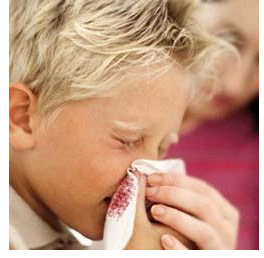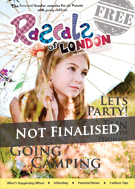Nosebleeds in children
Reviewed by Dr Robert Mills, consultant otolaryngologist
What causes nosebleeds?
A nose starts to bleed when one of the small veins in its lining bursts. This is usually caused by something completely harmless, such as the child picking their nose, blowing it too hard or having their nose knocked while playing.
Another reason could be that the child has pushed something inside their nose.

How should nosebleeds be treated?
A nosebleed can be a very traumatic event for the child.
They will often be scared and think something is seriously wrong with them because there is so much blood.
So it is important that the parent stays calm. They should cuddle the child and say something reassuring, like, 'It's OK, let's sit down, then you'll be fine. I'm here and I'll make sure you're OK.'
When the child is sitting down, hold their nostrils with your fingers, a handkerchief or a facecloth.
Pinch the lower, soft part of the nose between the thumb and forefinger.
The grip should be firm and the pressure on the nose steady.
Hold the child's nose for 10 minutes. Look at a watch so you are sure 10 minutes have passed before letting go.
If the child is old enough, teach them how and where to hold their own nose.
If in doubt, have the doctor or health visitor show you how to hold the nose.
It may be a good idea to read a story or watch television while waiting, to divert the child's attention.
After the nosebleed has stopped, the child should not play any rough games for a couple of hours to prevent the nosebleed starting again.
Tell the child not to pick, rub or blow their nose for a couple of days.
If the bleeding continues, try the same procedure once more.
If the bleeding doesn't stop, call the doctor.
Why does holding the nose help?
Holding the nose presses directly on the bleeding vein. This stops the bleeding and the blood will then coagulate or thicken into a scab.
Why should the child sit down?
Bleeding will stop faster if the child is sitting instead of lying down. It used to be recommended that a person with a nosebleed should lie down, but that makes the blood pressure in the head increase.
When the blood pressure goes up, more blood is pumped through the veins, which will make the nose bleed more and the nosebleed harder to stop.
Also if you lie back, blood will run down your throat. If the child swallows a lot of blood, they will vomit.
Why do some children get nosebleeds more often than others?
Some children have veins that are closer to the mucous membrane of their nose than other children. Because the veins are very close to the skin, they are more likely to burst when the child picks, blows or rubs their nose, or plays rough games.
Some children pick their nose a lot so they too are more likely to get nosebleeds. Cut the child's nails frequently. A little petroleum jelly applied on the inner side of the nose can also soften scabs.
If the child often gets nosebleeds, it may be a good idea to have a doctor examine them.
If the nosebleeds are caused by a vein that is very close to the skin, they can be prevented by cauterising the front of the nose. This is a simple procedure that can be carried out in the GP's surgery or hospital clinic.
How should you remove a foreign body from a child's nose?
If the child has put a foreign body up their nose, let a doctor remove it. Children are capable of putting the most surprising objects up their noses. It is best to have the doctor remove the object to avoid the risk of pushing it up further.
Are nosebleeds dangerous?
If the child often gets nosebleeds, or nosebleeds that are hard to stop, have a doctor examine the child. Children do not come to any serious harm from nosebleeds. Rarely, the bleeding may be due to a problem that prevents the child's blood clotting properly. This can be confirmed by a blood test.
When should the doctor be called in the case of nosebleed?
If there's a chance the child's nose may be broken.
If the bleeding can't be stopped (how to stop a nosebleed is described above).
If the child frequently gets nosebleeds that take more than 15 minutes to stop.
If the child has trouble breathing.
If the child is bleeding elsewhere, for example from their ears or gums.
If the child has a foreign body stuck up their nose.
Read more: http://www.netdoctor.co.uk/health_advice/facts/nosebleedchildren.htm#ixzz2UcWc7dU4 Follow us: @NetDoctor on Twitter | NetDoctorUK on Facebook




